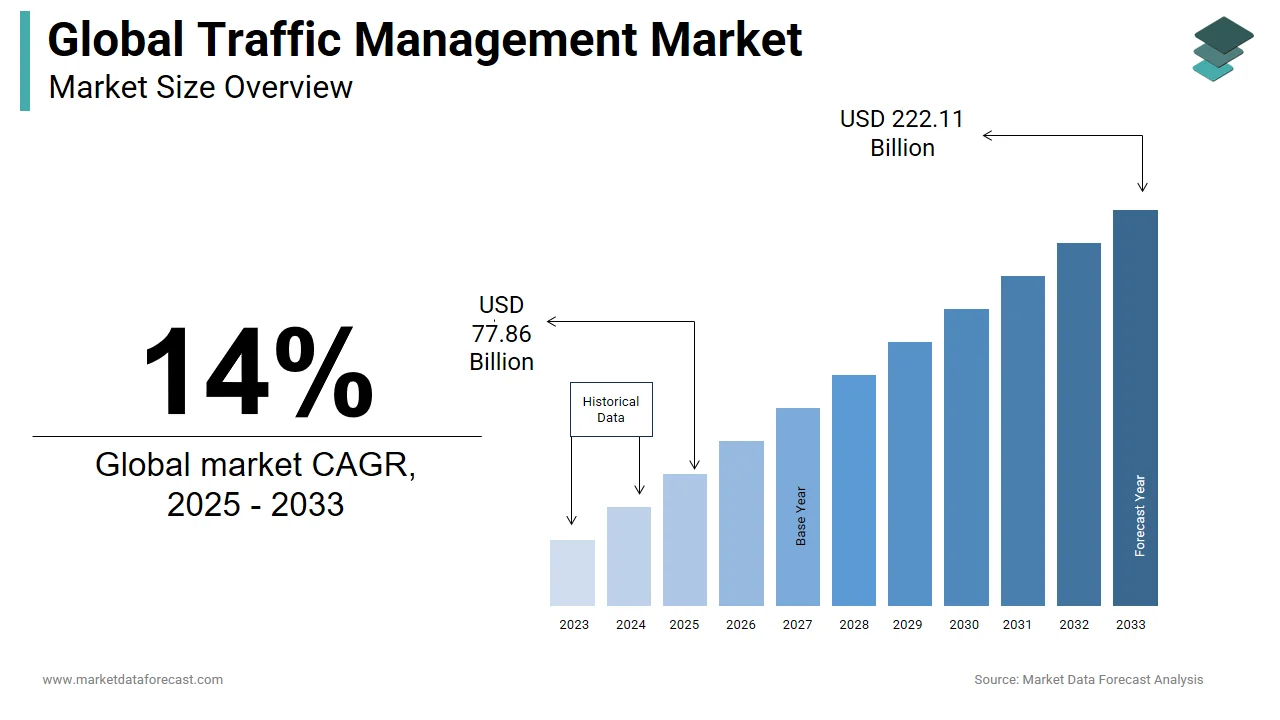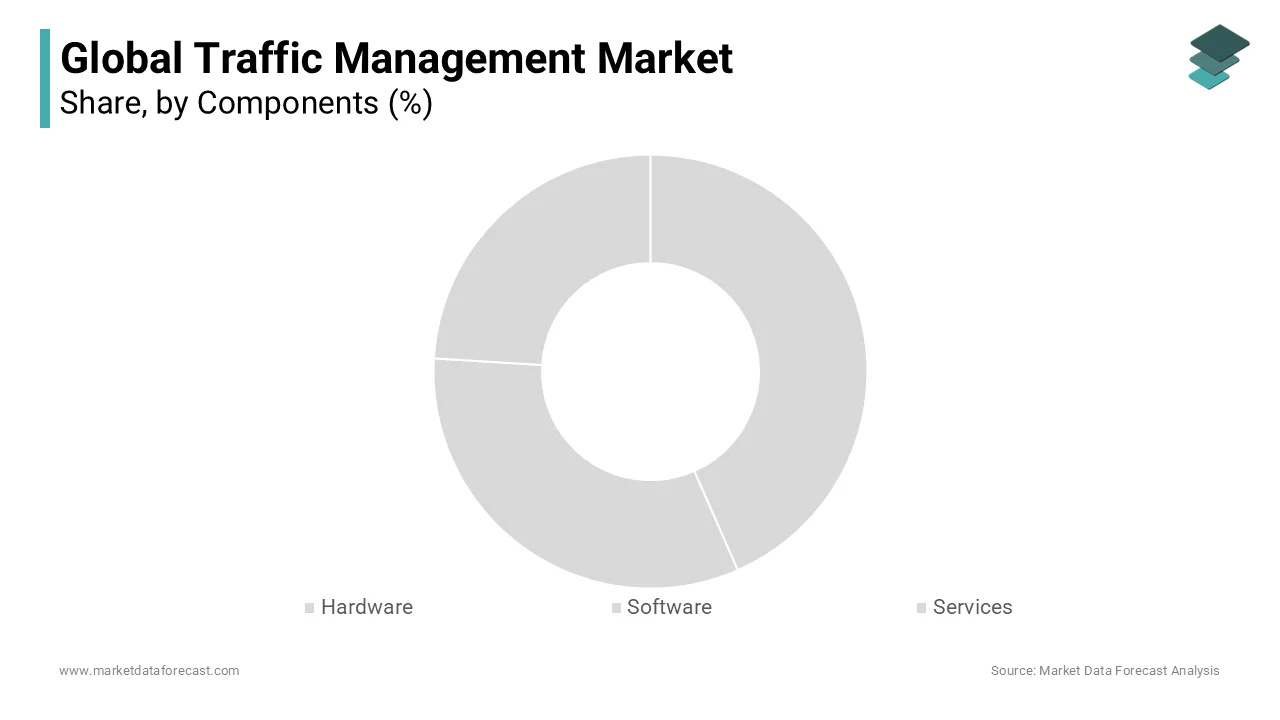Global Traffic Management Market Size, Share, Trends, & Growth Forecast Report – Segmented by Component (Hardware, Solutions, and Services), Solution (Smart Signaling, Route Guidance and Optimization, Traffic Analytics, and Smart Surveillance), Hardware (Display Boards, Sensors, and Surveillance Cameras), Services (Consulting, Integration and Deployment, and Support and Maintenance) & Region - Industry Forecast From 2024 to 2032
Global Traffic Management Market Size (2024 to 2032)
The global traffic management market was worth USD 59.91 billion in 2023. The global market is predicted to reach USD 68.30 billion in 2024 and USD 194.83 billion by 2032, growing at a CAGR of 14% during the forecast period.

Traffic management refers to one of the crucial branches of logistics. It includes controlling and purchasing transport services, planning, and reducing traffic density. Traffic management systems offer real-time data and the ability to analyze and respond immediately. The increasing population around the world results in the increased usage of vehicles, which leads to congestion problems in almost all the nations of the world. Traffic management helps resolve the issues associated with such traffic concerns. It supports the free flow of vehicles on roads. Surveillance cameras, a prominent part of traffic management, will likely witness the highest demand and growth rate in the coming years.
MARKET DRIVERS
The main drivers of the global traffic management market include growing urbanization, government initiatives to modify traffic infrastructure, and growing public concern for security.
The increasing urbanization has intensified the levels of traffic density, making it difficult for the mass public to travel. The factors that drive the global traffic management market include the increase in the volume of airline traffic control. Due to inventions, the market is currently in its growth phase, and developing a new traffic management system that replaces obsolete technology contributes to market growth. The traffic management software segment represents the largest market share. Due to the development of advanced traffic management software that helps minimize air traffic volume, transportation needs, and increased traffic, this problem occurs mainly due to the population in the city, increased traffic, and urbanization. These problems are increased primarily due to the population increase in cities and urbanization. The implementation and integration services sector is expected to represent the highest CAGR. With the development of the Internet and communications industry, the traffic management system can reduce congestion, harmful emissions, and accidents.
The growing demand for intermodal transport planning, urban traffic management, and control, route guidance, predictive traffic modeling, etc., on roads, railways, and airways drives the global traffic management market. The increasing adoption of air travel, combined with the rise of the tourism industry and the increase in the number of low-cost air carriers, drives the demand for navigation and surveillance services and traffic management systems. This will reduce air traffic congestion and stimulate global air growth, supporting the rise in the traffic management market in the coming years.
MARKET RESTRAINTS
The restrictions associated with the global traffic management market include significant capital investment, legacy infrastructure systems, and traffic barriers due to processing downtime. Due to the lack of funds, governments in weak and developing countries refrain from investing in new technologies for circulation systems. Many urban areas in these countries do not have traffic lights. However, some countries have begun to include primary forms of traffic management systems, for example, CCTV cameras.
REPORT COVERAGE
|
REPORT METRIC |
DETAILS |
|
Market Size Available |
2023 to 2032 |
|
Base Year |
2023 |
|
Forecast Period |
2024 to 2032 |
|
CAGR |
14% |
|
Segments Covered |
By Components, Hardware, Solutions, Services, and Region |
|
Various Analyses Covered |
Global, Regional & Country Level Analysis, Segment-Level Analysis, DROC, PESTLE Analysis, Porter’s Five Forces Analysis, Competitive Landscape, Analyst Overview on Investment Opportunities |
|
Regions Covered |
North America, Europe, APAC, Latin America, Middle East & Africa |
|
Market Leaders Profiled |
Accenture PLC (Ireland), Atkins Group (United Kingdom), Cellint (Israel), Cisco Systems, Inc. (United States), Citilog (France), Cubic Corporation (USA), EFKON AG (Austria), Esri (California, USA), FLIR Systems, Inc. (USA), IBM Corporation (USA), and others. |
SEGMENTAL ANALYSIS
Global Traffic Management Market Analysis By Components

The global traffic management business is divided into hardware, solutions, and services. Of these, the services segment will likely expand with the highest growth rate in the coming years, attributed to the necessity for timely maintenance of the traffic management hardware and software after installation.
Global Traffic Management Market Analysis By Hardware
The global traffic management market is divided into display boards, sensors, surveillance cameras, and others. The surveillance cameras segment is expected to account for the dominating share in the forecast period due to the increased adoption of surveillance cameras in developing regions to avoid mishaps and monitor traffic patterns.
Global Traffic Management Market Analysis By solutions
The global traffic management market is divided into intelligent signaling, route guidance and optimization, traffic analytics, and intelligent surveillance. The route guidance and optimization segment will likely account for a significant revenue share in the future because of the increasing demand for controlling traffic congestion worldwide.
Global Traffic Management Market Analysis By services
The worldwide traffic management market is segmented into consulting, integration and deployment, and backing and maintenance. The support and maintenance services are predicted to record the most substantial market value in the coming years.
REGIONAL ANALYSIS

The North America traffic management market is foreseen to register the dominant value in the global business, followed by Europe. The early adoption of technology, the presence of key players, and strict government policies are supporting the dominion of the European industry. Nonetheless, the Asia Pacific traffic management market is estimated to record the highest growth rate in the estimated period.
KEY PARTICIPANTS IN THE GLOBAL TRAFFIC MANAGEMENT MARKET
The major companies operating in the global traffic management market include Accenture PLC (Ireland), Atkins Group (United Kingdom), Cellint (Israel), Cisco Systems, Inc. (United States), Citilog (France), Cubic Corporation (USA), EFKON AG (Austria), Esri (California, USA), FLIR Systems, Inc. (USA), IBM Corporation (USA), among others.
RECENT HAPPENINGS IN THE GLOBAL TRAFFIC MANAGEMENT MARKET
In October 2018, Kapsch TrafficCom and OMV Aktiengesellschaft (oil and gas producer and distributor) joined to provide a standardized European electronic toll service (EETS) for trucks.
DETAILED SEGMENTATION OF THE GLOBAL TRAFFIC MANAGEMENT MARKET INCLUDED IN THIS REPORT
This research report on the global traffic management market has been segmented and sub-segmented based on the components, hardware, solutions, services, and region.
By Components
-
Hardware
-
Solutions
-
Services
By Hardware
-
Display Boards
-
Sensors
-
Surveillance Cameras
By solutions
-
Smart Signaling
-
Route Guidance and Optimization
-
Traffic Analytics
-
Smart Surveillance
By services
-
Consulting
-
Integration and Deployment
-
Support and Maintenance
By Region
-
North America
-
The United States
-
Canada
-
Rest of North America
-
-
Europe
-
The United Kingdom
-
Spain
-
Germany
-
Italy
-
France
-
Rest of Europe
-
-
The Asia Pacific
-
India
-
Japan
-
China
-
Australia
-
Singapore
-
Malaysia
-
South Korea
-
New Zealand
-
Southeast Asia
-
-
Latin America
-
Brazil
-
Argentina
-
Mexico
-
Rest of LATAM
-
-
The Middle East and Africa
-
Saudi Arabia
-
UAE
-
Lebanon
-
Jordan
-
Cyprus
-
Frequently Asked Questions
How is the global traffic management market addressing environmental sustainability?
The market is increasingly focusing on eco-friendly solutions, such as intelligent traffic light systems, real-time traffic monitoring to optimize routes, and the promotion of public transportation. These initiatives aim to reduce carbon emissions and promote sustainable urban mobility.
What role do emerging technologies like AI play in the global traffic management sector?
Artificial Intelligence is integral to traffic management, providing real-time analytics, predictive modeling, and adaptive control systems. AI helps optimize traffic flow, reduce congestion, and enhance overall transportation efficiency.
How are smart cities influencing the global traffic management market?
Smart city initiatives, integrating IoT and connected devices, are revolutionizing traffic management. Advanced sensors, intelligent traffic lights, and data analytics contribute to creating smarter, more efficient urban transportation systems.
How is the global traffic management market adapting to the rise of electric and autonomous vehicles?
The market is evolving to accommodate electric and autonomous vehicles through the integration of smart infrastructure, real-time data analysis, and the development of communication protocols that support these innovative modes of transportation.
Access the study in MULTIPLE FORMATS
Purchase options starting from $ 2500
Didn’t find what you’re looking for?
TALK TO OUR ANALYST TEAM
Need something within your budget?
NO WORRIES! WE GOT YOU COVERED!
Call us on: +1 888 702 9696 (U.S Toll Free)
Write to us: [email protected]